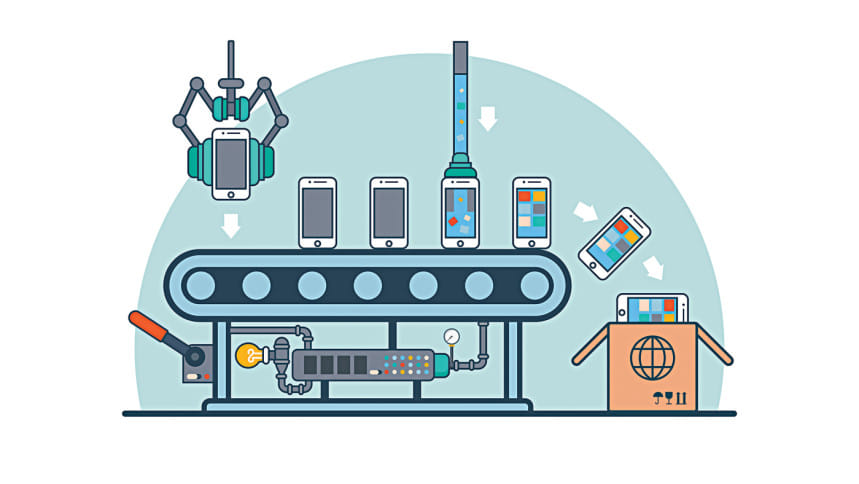VAT hike deals fresh blow to local handset industry

Bangladesh's mobile phone manufacturing industry, once hailed as a potential pillar of the country's digital ambitions, is bracing for a fresh blow after the interim government proposed a hike in value-added tax (VAT) at the production stage in the national budget for fiscal year 2025-26.
The move has sparked concerns among industry leaders, who warn it will drive up consumer prices, stall local production, and accelerate the growth of the grey market -- exacerbating the industry's woes.
Under the new structure, the VAT on handsets made entirely from locally produced components was raised from 2 percent to 4 percent.
For handsets assembled with at least two locally manufactured parts, the VAT has been raised from 5 percent to 7.5 percent.
Meanwhile, handsets fully assembled from imported components will now face a 10 percent VAT, up from 7.5 percent.
"Both consumers and manufacturers will be hurt by this move," Jakaria Shahid, a leader of the Mobile Phone Industry Owners' Association of Bangladesh (MPIOAB), told The Daily Star.
"Although we don't pass the entire burden onto customers, some of the effects inevitably trickle down onto them."
Alongside higher prices, he warned that smartphone penetration may be reduced and both the country's digital expansion goals and its "Made in Bangladesh" ambitions would be hampered by the move.
The VAT hike comes at a time when Bangladesh's mobile phone industry is already under pressure from rising taxes and policy uncertainty, which has contributed to a sharp drop in legal phone sales and a ballooning grey market.
The country made significant progress in mobile phone manufacturing following major tax incentives introduced in FY18. Since then, 17 local factories have been established, creating jobs for approximately 15,000 people.
Before FY22, the total tax on imported smartphones hovered at around 58 percent, while locally produced handsets enjoyed a lower tax burden of 15 to 20 percent.
However, this advantage is set to be eroded further.
Under the proposed terms, the cumulative tax burden on local manufacturing is estimated to exceed 40 percent, due to a 7.5 percent VAT applied at every stage -- from production to distribution to retail -- on top of the new production-stage VAT.
This policy environment is in sharp contrast to regional trends.
While India has capped total taxes on local production of handsets at around 25 percent and Pakistan at 20 percent, Bangladesh's tax rate remains the highest in South Asia.
Unsurprisingly, the smartphone market in Pakistan is now nearly twice the size of Bangladesh's, while India aggressively expands its "Make in India" initiative.
As a result, Bangladesh has seen a sharp decline in sales of locally manufactured handsets.
This can be seen by comparing FY21 to FY24. Over the period, smartphone sales dropped by 34 percent, feature phone sales fell by 42 percent, and the overall mobile market shrank by 39 percent, according to the MPIOAB data.
The vacuum created by declining legal sales is being filled rapidly by illegal imports. These smuggled handsets, which bypass taxes and VAT, are sold at significantly lower prices.
"The grey market now accounts for nearly 50 percent of all phone sales. And with the latest VAT hike, it could easily surpass 60 percent," warned Rizwanul Haque, vice-president of the MPIOAB.
He urged the government to reconsider the VAT hike and instead explore ways to support the industry and safeguard investor confidence.
Haque proposed a five-point policy to ensure long-term stability and growth.
First, he called for stable policies with at least a five-year horizon to reassure investors.
Second, he urged the government to allow locally manufactured accessories such as batteries, chargers, and cables to be sold freely in the open market to build backward linkages due to lack of customs policy.
Third, he demanded the immediate removal of the 7.5 percent VAT at the sales stage to make legally manufactured phones more competitive.
He also emphasised the need for swift implementation of the National Equipment Identity Register to block illegal phones from accessing mobile networks.
Finally, he recommended prioritising completely knocked down manufacturing over semi knocked down production to deepen local value addition and create more jobs.
If the government fails to act, Haque warned, the damage to local manufacturing could become irreversible -- pushing Bangladesh further away from its digital and economic development goals.

 For all latest news, follow The Daily Star's Google News channel.
For all latest news, follow The Daily Star's Google News channel. 








Comments